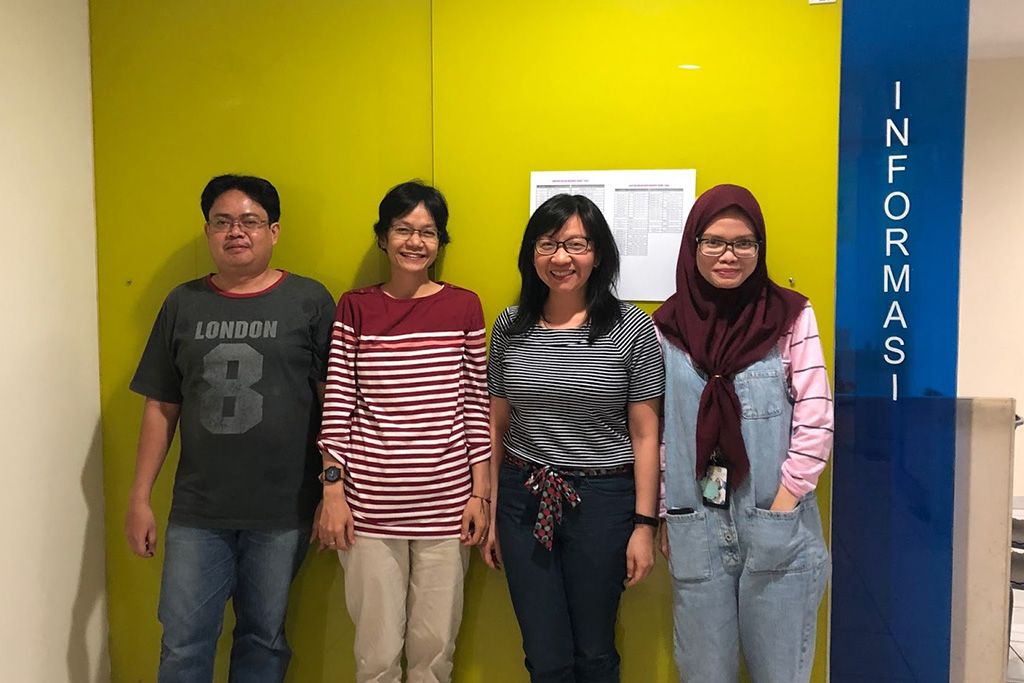Universitas Indonesia, the number one ranking university in Indonesia, had their own English placement test — but language centre managers felt that a new generation needed a new approach.
Background
Lembaga Bahasa Internasional (LBI) is the language centre of Universitas Indonesia, the number one ranking university in the country. The university has a student population of 42,000, and LBI runs English courses for approximately 6,000 students per year. The centre teaches nine other languages in two campuses, one in central Jakarta and the other in West Java.
Placement testing at LBI
Until 2019, LBI ran a paper-based placement test designed and created by the centre itself. Ibu Sisilia, Senior Director at LBI, says that the primary motivation for switching to the Dynamic Placement Test is ‘because it is more relevant to the younger generation nowadays.’ Vice Director of LBI, Ibu Memmy, adds: ‘The test itself is riveting, and I believe it will be suitable for the general placement test at my institution.’
The secondary motivation is that an online placement test is more flexible and convenient because students do not need to be on (either) campus to take the test. They can either do the test directly at LBI (using their phone or laptop, or an LBI computer) or they can do it at home.
How does it work (overview)?
Test concept: LBI has 10 levels of General English classes. This meant adapting the output of the Dynamic Placement Test result from the standard six CEFR levels to the 10 levels required. The centre determined that the most appropriate way of doing this was to divide each of A1 to B2 into two parts, and to leave C1 and C2 as is. This was then tested with teachers and students at LBI and found to be an effective solution.
Timing and setup: Term 1 2020 starts on 13th January 2020 and the registration period is 18th November – 26th December 2019. Clarity’s partners in Indonesia, Solusi Educational Technology (SET), liaised with LBI to set up the test parameters, the logins and passwords and the reporting mechanisms (see below).
Procedure: Students first pay the fees, and are then given a login for the test. They do the test in the centre or at home. Students who achieve level 5 or above may be asked to do an additional writing or speaking test.
How does it work (in detail)?
- SET provides LBI with the test instructions, FAQs, errors sometimes made by test takers (e.g. not reading the instructions), as well as the support phone number.
- SET creates 1,000 tests for both LBI locations in the Dynamic Placement Test Admin Panel and sends LBI the 1,000 logins and passwords in a Google Sheet.
- To each of these logins, LBI adds a student ID and name.
- Students take the test during the 18th November – 26th December registration period.
- SET updates the test results in the Google Sheet with test completion date and test result at 8.00 AM, 2.00 PM and 6.00 PM every day (except Sunday and holidays) during the registration period.
- LBI checks the test result, places the student in the appropriate class and decides if the student needs to take the writing test and to be interviewed.
Up to 26th November 2019 afternoon, 211 participants from both locations had taken DPT. There have been no failures.
Student reaction
A cross-section of students at different levels of English will be interviewed at the end of the initial testing period, and this document will be updated as this progresses. In the meantime, some informal, ‘vox pop’ feedback has been received:
- ‘It is very good. The layout looks good and it could be accessed from a mobile phone. Audio is very clear and then it’s easy to drag the answers.’
- ‘The audio and layout are clear. Some people might not be familiar with drag and drop questions, which makes them spend more time in answering questions.’
- ‘The test is good.’
- ‘No problem in doing the test.’
When Clarity and telc Language Tests were conceptualising the Dynamic Placement Test, one of the early objectives was to make the test fun, and to reduce test stress. As Sean McDonald, lead content developer, says in this interview from April 2017: ‘[Testing] has evolved into a coercion tool, and I’m sorry to say at the moment people don’t take tests for fun. It costs money, it takes time, people are afraid of tests. So those are things that I would like to change about testing because I think, you know, what is wrong with showing how good you are?’
It is particularly satisfying that Universitas Indonesia has adopted the Dynamic Placement Test partly, at least, because they feel that students will have a good experience with the test. It’s going to be fascinating to see whether they are right.
Update: Click here to see the results of a survey of test takers carried out six months later.
Further reading:
Experiment to trial Dynamic Placement Test at Wenzao University
Dynamic Placement Test by ClarityEnglish
Do students prefer digital or paper-based tests?

